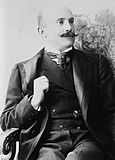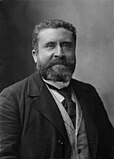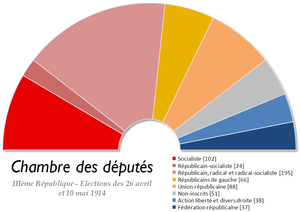
The Radical-Socialist and Radical Republican Party was a liberal and social-liberal political party in France. It was also often referred to simply as the Radical Party, or to prevent confusion with other French Radical parties as the Parti radical valoisien, abbreviated to Rad, PR, or PRV.
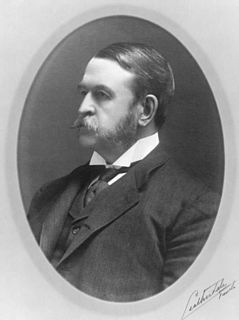
Sir James Pliny Whitney, KCMG was a Canadian politician in the province of Ontario. Whitney was a lawyer in eastern Ontario, Conservative member for Dundas from 1888 to 1914, and the sixth Premier of Ontario from 1905 to 1914.
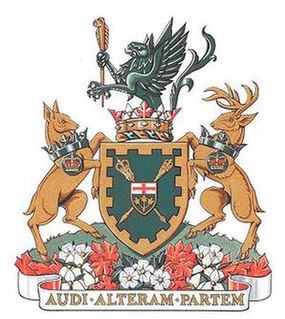
The Legislative Assembly of Ontario is one of two components of the Legislature of Ontario, the other being the Lieutenant Governor of Ontario. The Legislative Assembly is the second largest Canadian provincial deliberative assembly by number of members after the National Assembly of Quebec. The Assembly meets at the Ontario Legislative Building at Queen's Park in the provincial capital of Toronto.

The 26th Manitoba General Election was held on May 14, 1959 to elect 57 members to the Legislative Assembly of Manitoba, Canada. It resulted in a majority victory for the incumbent Progressive Conservatives under the leadership of Premier Dufferin Roblin. This was the first time since the 1914 election that the Tories won an outright majority in the province.
The Citizen and Republican Movement is a political party in France. The party replaced, in 2002, the Citizens' Movement founded by Jean-Pierre Chevènement, who left the Socialist Party (PS) in 1993 due to his opposition to the Persian Gulf War and to the Maastricht Treaty. It is a Eurosceptic party with leftist aspirations.

The French legislative elections took place on 12 March and 19 March 1978 to elect the sixth National Assembly of the Fifth Republic.

Debout la France is a French political party founded by Nicolas Dupont-Aignan in 1999 under the name Debout la République as the "genuine Gaullist" branch of the Rally for the Republic (RPR). It was relaunched again in 2000 and 2002 and held its inaugural congress as an autonomous party in 2008. At the 2014 congress its name was changed to Debout la France.

The 3rd constituency of the Aisne is a French legislative constituency in the Aisne département.
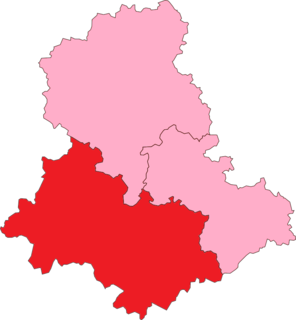
The 2nd constituency of Haute-Vienne is a French legislative constituency in the Haute-Vienne département. Like the other 576 French constituencies, it elects one MP using the first past the post election system with a run-off.

The 2nd constituency of Maine-et-Loire is a French legislative constituency in the Maine-et-Loire département. Like the other 576 French constituencies, it elects one MP using the first past the post election system with a run-off.

The 7th constituency of Maine-et-Loire is a French legislative constituency in the Maine-et-Loire département. Like the other 576 French constituencies, it elects one MP using the first past the post election system with a run-off.

The 4th constituency of the Seine-Maritime is a French legislative constituency in the Seine-Maritime département. Like the other 576 French constituencies, it elects one MP using the two-round system, with a run-off if no candidate receives over 50% of the vote in the first round.

The 2nd constituency of the Loiret is a French legislative constituency in the Loiret département. Like the other 576 French constituencies, it elects one MP using the first past the post election system with a run-off.
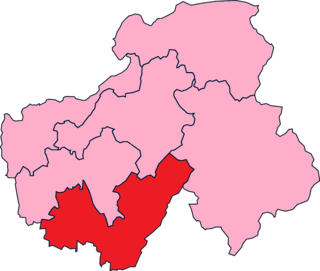
The 2nd constituency of the Haute-Savoie is a French legislative constituency in the Haute-Savoie département. Like the other 576 French constituencies, it elects one MP using the first past the post election system with a run-off.

The 6th constituency of the Haute-Savoie is a French legislative constituency in the Haute-Savoie département. Like the other 576 French constituencies, it elects one MP using the first past the post election system with a run-off.
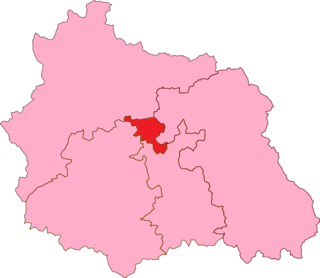
The 1st constituency of the Puy-de-Dôme is a French legislative constituency in the Puy-de-Dôme département. Like the other 576 French constituencies, it elects one MP using the first past the post election system with a run-off.

The 3rd constituency of the Rhône is a French legislative constituency in the Rhône département. Like the other 576 French constituencies, it elects one MP using the first past the post election system with a run-off.

The 14th constituency of the Rhône is a French legislative constituency in the Rhône département. Like the other 576 French constituencies, it elects one MP using the first past the post election system with a run-off.
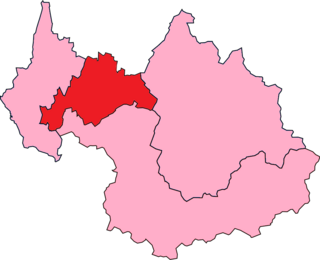
The 4th constituency of the Savoie is a French legislative constituency in the Savoie département. Like the other 576 French constituencies, it elects one MP using the first past the post election system with a run-off.
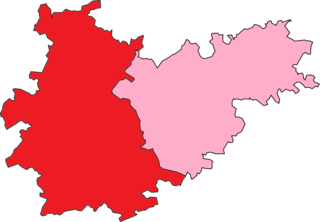
The 2nd constituency of the Tarn-et-Garonne is a French legislative constituency in Tarn-et-Garonne département. Like the other 576 French constituencies, it elects one MP using the two-round system, with a run-off if no candidate receives over 50% of the vote in the first round.

